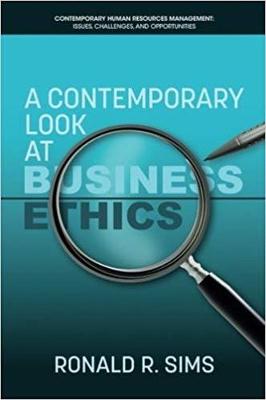Contemporary Human Resources Management
2 total works
A Contemporary Look at Business Ethics provides a `present day’ look at business ethics to include the challenges, opportunities and increased need for ethical leadership in today’s and tomorrow’s organizations. The book discusses current and future business ethics challenges, issues and opportunities which provides the context leaders and their organizations must navigate.
The book includes an in?depth look at lessons learned about the causes of unethical behavior by examining a number of real?world examples of ethical scandals from around the world that have taken place over the past few decades. The analysis of the various ethical scandals focuses on concepts like ethical versus unethical leadership, received wisdom, the bottom?line mentality, groupthink and moral muteness, all of which contribute to the kind of organizational culture and ethical behavior one finds in an organization. The book discusses ethical decision making in general and the increased role of religion and spirituality, in confronting unethical behavior in contemporary organizations.
The book also takes an in?depth look at the impact ethical scandals have on employees and more specifically the psychological contract and person?organization ethical fit with the goal of identifying, along with other things, what leaders can do to restore relationships with employees and rebuild the organization’s reputation in the eyes of various stakeholders.
The book includes an in?depth look at lessons learned about the causes of unethical behavior by examining a number of real?world examples of ethical scandals from around the world that have taken place over the past few decades. The analysis of the various ethical scandals focuses on concepts like ethical versus unethical leadership, received wisdom, the bottom?line mentality, groupthink and moral muteness, all of which contribute to the kind of organizational culture and ethical behavior one finds in an organization. The book discusses ethical decision making in general and the increased role of religion and spirituality, in confronting unethical behavior in contemporary organizations.
The book also takes an in?depth look at the impact ethical scandals have on employees and more specifically the psychological contract and person?organization ethical fit with the goal of identifying, along with other things, what leaders can do to restore relationships with employees and rebuild the organization’s reputation in the eyes of various stakeholders.
When a New Leader takes Over: Toward Ethical Turnarounds takes a detailed look at the experiences of new leaders who are charged with turning an organization around following an ethical scandal. The challenges confronting new leaders who are tasked with restoring trust, rebuilding reputation, and turning around an organization following an ethical scandal are discussed along with specific actions taken by these leaders during the turnaround process. A main focus of the book is to offer insight into the difficult situations confronting new leaders at the beginning, during and after their turnaround experiences which means turning an unethical organizational culture into an ethical one. A number of examples of turnaround efforts that have taken place over the past two decades are included to provide the most comprehensive documentation of the ethical turnaround process.
The book includes an in-depth look at what led to the unethical behavior by examining a number of real-world examples of ethical scandals from around the world. The book will provide an analysis of the various ethical scandals by focusing on concepts like unethical leadership, received wisdom, groupthink and moral silence, all of which contribute to the kind of organizational culture and unethical behavior one finds in organizations that experience ethical scandals. The book also discusses proactive leadership and its importance in implementing ethical turnarounds based on values-based leadership, employee involvement and ethics education. A main premise of this book is that new leaders can successfully create an organization environment to rebuild and institutionalize ethical behavior as part of the turnaround process and sustain ethical behavior beyond the turnaround.
The book will be of interest to employees at all levels of an organization, business professionals and other practitioners and others who have an interest in organization change, transformation and ethical turnarounds.
The book includes an in-depth look at what led to the unethical behavior by examining a number of real-world examples of ethical scandals from around the world. The book will provide an analysis of the various ethical scandals by focusing on concepts like unethical leadership, received wisdom, groupthink and moral silence, all of which contribute to the kind of organizational culture and unethical behavior one finds in organizations that experience ethical scandals. The book also discusses proactive leadership and its importance in implementing ethical turnarounds based on values-based leadership, employee involvement and ethics education. A main premise of this book is that new leaders can successfully create an organization environment to rebuild and institutionalize ethical behavior as part of the turnaround process and sustain ethical behavior beyond the turnaround.
The book will be of interest to employees at all levels of an organization, business professionals and other practitioners and others who have an interest in organization change, transformation and ethical turnarounds.

